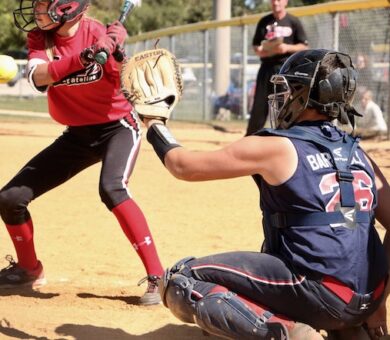Feeling Alone During the Recruiting Process
Guide: Tips For Dealing With The Recruiting Process Alone
Sometimes you find yourself in a situation where your high school and/or club coaches are not as interested, or maybe not as equipped, as you would like in helping you with the recruiting process. The recruiting process is hard enough with lots of help, so when you don’t feel like you have allies, it can seem even harder.
Sometimes you find yourself surrounded by people, including loved ones, who have never dealt with the recruiting process before and can’t give the sound advice or comfort you need to help find the right college. If this is you, know that you are not alone. Many student athletes find themselves beginning the recruiting process alone.
Just know this: There are other people and other ways to navigate this challenging process. If your parents, high school and/or club coaches are not able to help much, there are other ways to find out what you need to know to proceed.

Tips for Dealing With the Recruiting Process Alone
You may have some thoughts and ideas of ways to help yourself deal with the recruiting process alone, but here are some ideas we have seen work for student athletes. Some may apply to your situation and others may not, but hopefully these true-to-life examples give you some things to think about.
Find Other Allies
Look for other people who you think can help you. First, find out how much your parents can help you. Many parents don’t understand the recruiting process, but that doesn’t mean they can’t help you make some decisions and find other resources to help.
Another person who may be able to help you is a guidance counselor at your high school. He or she should be able to help you align your classes correctly so you are taking relevant core courses that will count toward college eligibility. Get to know your counselors. Have any of them helped other students attend college? Ask them if they know what you would need to play college sports.
Ask your teachers in the school if any of them know how to help you. One student athlete, Beth, found out that her English teacher’s daughter attended a different high school and played in college. The high school coach at the other high school knew who Beth was. She met with Beth and helped her get in touch with some college coaches who could help her.
Consider all the coaches in the school. One student athlete, Deb, used a volleyball coach to help her get a basketball scholarship. This athlete played two sports, and the volleyball coach understood the process a little better than the basketball coach. Deb ended up finding the perfect fit and still praises the volleyball coach today for helping her.
Use all of your resources. A student athlete named Terri found a friend from church whose mom played in college. Terri was able to sit down with her friend’s mom to help figure out what her next steps should be in the recruiting process.
Don’t forget about your teammates. Do any of them have older siblings who went through the recruiting process? I coached a student athlete who went through her teammate’s parents to begin the recruiting process.
Continue to engage with your high school coaches, even if they don’t seem like they are helping. They may still have information that is helpful to you in the process. An athlete named Jamie had a high school coach who did not tell her that a certain college was very interested in her. The college coach asked the high school coach to have Jamie call her. The call never happened because the high school coach never told Jamie. Jamie found out by just stopping by the office of her high school coach and having a discussion about the next game.

Find Ways to Gain Exposure
If you don’t have your high school coaches talking for you and helping you get your name out there, it is up to you to do so.
One idea might be joining a club team if it is possible to do so. When you look for a club team, there are things to watch out for. You need someone who will help you beyond just the sport itself. You need some good guidance. Finding a good club coach can help. Sometimes, there is a cost involved with club programs.
Another idea is to make game videos and highlights. Be very careful about spending a lot of money producing videos. Some coaches do not evaluate talent from anything except game films. Having both is a good idea, but spending a lot of money to make highly produced videos with a lot of great music and graphics could be a waste. Coaches just want to see if you can play.
One last word on videos. Seldom, if ever, do coaches sit and watch your entire game. They have several videos to go through and don’t have time to watch. They most likely will fast forward to parts of the game that are relevant for what they are looking for. At the same time, depending on your sport, highlight videos are not the main evaluation measure of your talent. A softball pitcher may do well to make a highlight film, but a basketball player needs to include game videos. Coaches want to see you play.

Another way to get exposure is to attend a college camp. Some camps are too expensive, but there are other camps that are held as one-day events or high school team events. If your high school coach has no interest, maybe you could ask to join another high school team, or go with your club team or call the college coach and ask if you can come as an individual who will play on other teams.
Your goal for attending camp is not only to improve as a player, but to have a college coach evaluate you and let you know what level they think you can play.
Getting some exposure will increase the chances of you being seen by a college coach who thinks you have the talent to play for him or her.
Communication
Nothing says you can’t email a college coach, call a college coach or go visit a college and meet a coach. These are all things in your control and they are things you can do any time, except visiting a college coach on campus during a dead period.
Communicating with college coaches not only shows character, but will lead you to more opportunities and more answers. College coaches probably know what level you can play. They know how the recruiting process works and they can steer you in the right direction as you form a list of schools and begin the process of finding a college that is right for you.
The more you communicate about your desire to play in college, the more opportunities you have to find people that can become allies to you in the recruiting process.

Keep Working Hard
As your recruiting journey continues, don’t forget to keep training and keep working on your development. You never know who is watching and what opportunities lie ahead.
For example, Mindy attended a club tournament during the summer where a top Division I coach saw her play. Mindy could not play for the top Division I program, but that coach happened to know someone at another college who was looking for someone with Mindy’s talent. After the college coaches exchanged the information, Mindy began being recruited by the second college.
Another athlete, Elise, was spotted by a men’s college coach who just happened to catch the end of a high school girls’ practice that took place before the boys’ practice. He brought the information back to the women’s college coach who then began recruiting Elise.
Things like the above examples happen all the time, so keep working as hard as you can.
One Last Important Point
These are some ideas for you to think about, and maybe try, as you venture into the recruiting process. Whatever you do, don’t allow your circumstances to hinder you from going through the process. Many student athletes who had no initial support when they began the recruiting process made it to the next level and had highly successful careers.
It takes work, but it is not impossible to find the support and the answers you need to continue through the process. You do not have to go through it alone. Reach out and find that support.
For more answers and information, reach out to hello@findmyteam.com.


